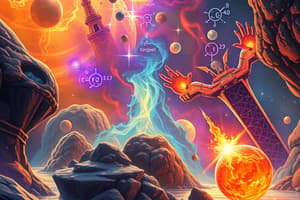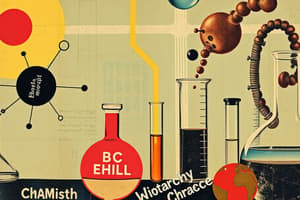Podcast
Questions and Answers
What is 'matter'?
What is 'matter'?
- Anything that can be touched
- Anything that is visible
- Anything that can be seen
- Anything that occupies space and has mass (correct)
What is an 'element'?
What is an 'element'?
A pure substance that cannot be broken down into other substances by chemical reactions.
What defines a 'compound'?
What defines a 'compound'?
A substance containing two or more elements chemically combined in a fixed ratio.
What is the smallest particle of an element?
What is the smallest particle of an element?
What charge does a proton have?
What charge does a proton have?
What is an electron?
What is an electron?
What is a neutron?
What is a neutron?
What is the nucleus of an atom?
What is the nucleus of an atom?
What does the atomic number represent?
What does the atomic number represent?
What is a radioactive isotope?
What is a radioactive isotope?
What defines an isotope?
What defines an isotope?
What is an ionic bond?
What is an ionic bond?
What is an ion?
What is an ion?
What is a covalent bond?
What is a covalent bond?
What is a molecule?
What is a molecule?
What is a chemical reaction?
What is a chemical reaction?
What are reactants?
What are reactants?
What are products in a chemical reaction?
What are products in a chemical reaction?
What defines an organic compound?
What defines an organic compound?
What defines an inorganic compound?
What defines an inorganic compound?
What are valence electrons?
What are valence electrons?
What is a single bond?
What is a single bond?
What is a double bond?
What is a double bond?
What is a chemical formula?
What is a chemical formula?
What is a structural formula?
What is a structural formula?
What does a chemical reaction indicate?
What does a chemical reaction indicate?
Flashcards are hidden until you start studying
Study Notes
Basic Chemistry Concepts
- Matter: Any substance that occupies space and possesses mass.
- Element: A pure substance that cannot be decomposed into simpler substances by chemical means.
- Compound: Formed when two or more elements are chemically combined in a fixed ratio.
Atomic Structure
- Atom: The smallest unit of an element that retains its chemical properties.
- Proton: Positively charged subatomic particle located in the nucleus.
- Electron: Negatively charged subatomic particle that orbits around the nucleus.
- Neutron: Subatomic particle with no charge, found in the nucleus.
- Nucleus: Core of the atom, composed of protons and neutrons.
Atomic Properties
- Atomic Number: Unique identifier for an element, equal to the number of protons in an atom.
- Isotope: Variants of an element with the same number of protons but different numbers of neutrons.
- Radioactive Isotope: An unstable atom whose nucleus decays, emitting particles and energy.
Chemical Bonds
- Ionic Bond: Formed through the transfer of electrons between atoms.
- Ion: An atom that has either lost or gained electrons, resulting in a charge.
- Covalent Bond: Created when atoms share electrons, leading to molecule formation.
Molecular Structure
- Molecule: Group of atoms bonded together by covalent bonds.
- Chemical Formula: Represents the types and numbers of atoms in a molecule.
- Structural Formula: Illustrates the arrangement of atoms within a molecule.
Chemical Reactions
- Chemical Reaction: Process where substances interact to form new substances.
- Reactant: Starting material in a chemical reaction, positioned on the left side of the equation.
- Product: Resulting substances of a reaction, found on the right side of the equation.
Compound Classification
- Organic Compounds: Molecules composed of carbon atoms and may include other elements.
- Inorganic Compounds: Substances made of two or more elements excluding carbon.
Electron Configuration
- Valence Electrons: Electrons in the outermost shell that participate in chemical bonding.
- Single Bond: A bond where one pair of electrons is shared between two atoms.
- Double Bond: A bond where two pairs of electrons are shared between two atoms.
Summary of Key Terms
- Understand the distinction between various forms of chemical bonds and the nature of matter.
- Recognize the importance of atomic structure in determining element properties and reactions.
- Be able to describe the process and products of chemical reactions effectively.
Studying That Suits You
Use AI to generate personalized quizzes and flashcards to suit your learning preferences.




